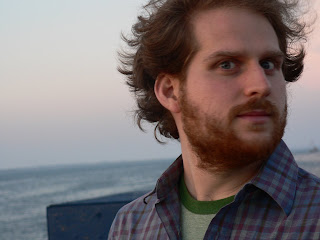
I've been trying to give Farrah (yay!) good advice as she works on her novel in progress and find myself through lack of practice with fiction no longer acclimated to the basics, such as narration. It's amazing in a way that after a few hundred years of writing these things we just accept the feeling of this person writing with an "I" in which there is simply no context. I feel the same way when I turn on network television after a long time away, or right now as I wander by the propagandistic ad posters glued all over Manhattan: what a completely radical, noisy, totally artificial landscape to feel normal around. Astonishing what you don't even notice yourself getting used to. So I open a book and keep thinking, why are you telling me this. (Italics can be distributed as preferred.) Of course it's taken weblogs about ten minutes to normalize the converse relation of private/public journal. But obviously the mixture of voice and tense in fiction makes the problem all the more glaring--who are you and when did we get intimate, like waking into a marriage of amnesiacs, or at least one drunken one night stand...
I was reminded of this issue today browsing books in the Barnes and Nobles on Lexington at 86th st. (which boasts a surprisingly decent poetry section and should not be confused with the branch on 86th st east of Lexington, which doesn't) and getting sucked into Dorothea Lasky's Awe. It caught my eye because I had just been looking at H-NGM-N's web site yesterday and read about the flipbook-chapbook they made out of poems of hers and my Columbia mate Sam Amadon's. In any case, Awe was a fun discovery for the day and absolutely demonstrates the very unexplored weirdness of talk as a formal device. Lasky sometimes uses tiny emphatic Q and A intrusions into a smear of directed thoughts that suggest arrows shot off at funny angles and bouncing round to smack the archer. Let me answer my own questions, in other words, and with exclamation points. It might be a little slapstick but, you know, "poetic slapstick," as Pauline Kael said, and thus disarming and windowlike. I don't see tricks here so much as personality--there's a fair amount of the word God in the book (goes with Awe, perhaps) deployed I think as a placeholder for why anyone would tell anyone anything. Because, maybe, they already know? Funny, given my instant thought of Q and A in the bookstore that when I googled her name just now I came up with the above video of her literally being interviewed.
The other book I've been reading lately is Joanne Kyger's selected poems As Ever. I loved her poem "Carl Jung Greeted" in Stephanie Young's aforementioned Bay Poetics, which seriously ranges--psychology, politics, the cosmos--to capture a very accurate portrait it seemed to me of how it feels to feel these days. I found it fascinatingly hard to locate a copy of the book, despite its being published by Penguin--no copies for instance anywhere in Boston, so far as I could tell. Strange because it illustrates elegantly what can grow over decades in an Olsonian open field and it seems to me people that people would like that. I like this: "There was a long time in silence. For myself I can tell you that certain things give me limited pleasure for short stretches of time / but I do not know where to put them."
She can tell me, and I can tell you.

No comments:
Post a Comment